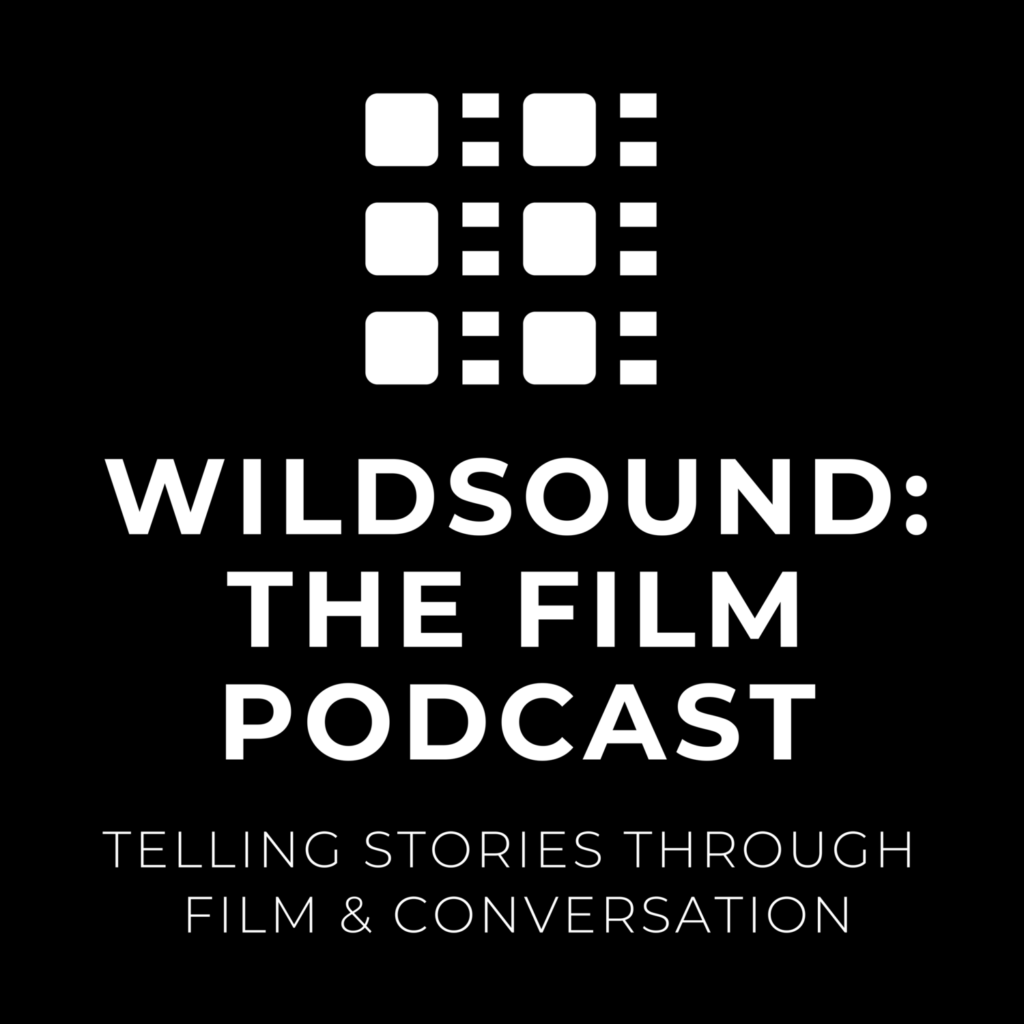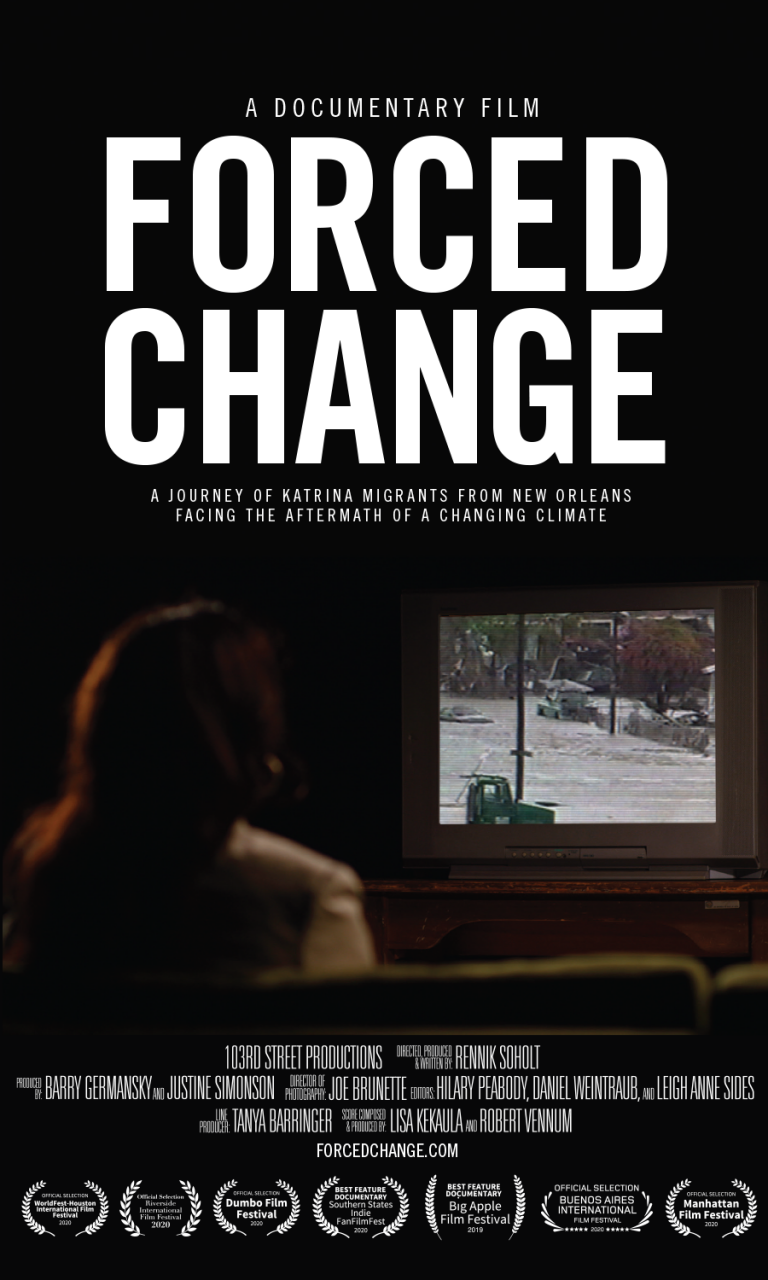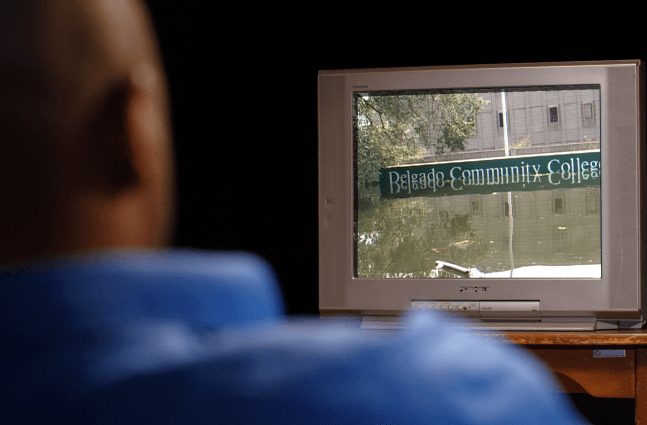Sneak peeks at ‘Spirit Halloween: The Movie,’ the war drama ‘Devotion,’ and the Hurricane Katrina doc ‘Forced Change.’ David Daniel has a look.
Sneak peeks at ‘Spirit Halloween: The Movie,’ the war drama ‘Devotion,’ and the Hurricane Katrina doc ‘Forced Change.’ David Daniel has a look.
Forced Change, a documentary by filmmaker Rennik Soholt, highlights the intimate stories of people who left New Orleans in the wake of Hurricane Katrina in 2005 and never returned. Filmed throughout the course of fourteen years, Soholt interviews four people, all of whom he’d known personally before he made the film, about their choice not to return to the city they loved. Interviewees describe having struggled with relationships and substance abuse after the devastation of the storm. They also recount the challenges of finding new homes and of returning to city to find remnants of destroyed properties.
Soholt lived in New Orleans before moving to New York City in 2002. After New Orleans reopened in October of 2005, he returned several times over a period of years, as well as traveled to Texas, to document the struggles of his friends. After that, Soholt returned multiple times throughout the next few years, as well as traveling to Texas, documenting the lives of those who left. In November 2019, the film debuted at the Big Apple Film Festival, where it was awarded Best Documentary Film. It continued to screen throughout the Pandemic at various virtual film festivals.

On the 17th anniversary of the disaster, the director of Hurricane Katrina doc Forced Change details his epic path to completing his film.
“I may not have gone where I intended to go, but I think I have ended up where I needed to be.”
― Douglas Adams
“Perhaps the story you finish is never the one you begin.”
― Salman Rushdie
Einstein proposed and published two world-altering scientific papers connected to the theories of relativity. First, in 1905, there was the special theory of relativity and then, in 1915, his greatest achievement: the general theory of relativity. Together, these theories revolutionized theoretical physics, throwing traditional Newtonian laws of motion and mechanics from the center of human import.
The impact of Hurricane Katrina was felt throughout the country if not the world. But the changes of that August 2005 storm had consequences that not only helped shape a city but the people of it even years later. As we enter into another possibly volatile storm season, a documentary that follows different people who lived in New Orleans during Katrina throughout the year. Forced Change looks at the impact of the storm on the area, their lives, and how it may not have been all bad.
From the moment the levees broke in New Orleans, the world knew the city would never be the same. But it wasn’t just the flood water that changed in the city – it was the demographics. While there are some people who decided to stay in the city or return to it after to help with the clean-up efforts – many didn’t. These are the people that Forced Change talks to, the families and individuals who left the city after the storm for multiple reasons. Some took it as an opportunity to start over, others feel the constant pull of their home to return.
A new documentary presents the lives of multiple people who were forced to leave their beloved home city of New Orleans in the aftermath of Katrina and the lasting repercussions of that change.
The hall of famer, Chris “Mad Dog” Russo, joins the program and we shower him with the adulation that he deserves. Plus, we have Rennik Soholt on to talk about his new documentary “Forced Change”.
The hall of famer, Chris “Mad Dog” Russo, joins the program and we shower him with the adulation that he deserves. Plus, we have Rennik Soholt on to talk about his new documentary “Forced Change”.
‘Forced Change’ – Documentary uncovers stories of Katrina Survivors
Rennik Soholt documentary tells the story of Katrina survivors that didn’t return to the city
Writer/director Rennik Soholt’s documentary Forced Change follows four families from New Orleans displaced by Hurricane Katrina in 2005. They never came back. Soholt tells their respective stories from the perspective of what happened just after the disaster and then updates each family’s trajectory in the years that followed. Fourteen years of reporting shows the immediate and long-term impact of living through that event. Every journey of displacement takes on unique positives and negatives as these people rebuild their lives and respond to life-changing decisions forced upon them. In fact, we are informed at the outset that 100,000 people never came back to New Orleans.
The aftermath of Katrina sparked several documentaries and scripted programs that spoke to the disaster and the situation: geographically, politically, financially, and socially that set New Orleans up for the devastation the storm caused. Spike Lee covered this ground in his 4-part 2006 documentary When the Levees Broke: A Requiem in Four Acts. David Simon looked at the years following Katrina in his 2010 HBO series Treme, which focused on the blue-collar Treme neighborhood struggling to rebuild.
David Shuster hosts. “Forced Change” documentary filmmaker Rennnik Soholt discusses his film and the effects of Hurricane Katrina.
This is a pointer toward FORCED CHANGE which is being release today.
The film is the story of three families dealing with the changes brought by Hurricane Katrina. Though the storm was almost two decades ago the effects are still being felt today.
Filmed over 14 years the film is a document of what the families faced right after the storm and how they have fared over the years since. Not only do we see how they faced losing pretty much everything but also how they tried to put it all back together and how they cope living in a place that isn’t New Orleans, which they still consider their home.
A new documentary presents the lives of multiple people who were forced to leave their beloved home city of New Orleans in the aftermath of Katrina and the lasting repercussions of that change.
Hurricane Katrina displaced hundreds of thousands of residents of New Orleans and many never returned. For the past decade, filmmaker Rennik Soholt has followed the lives of several families who fled. Now, hear the personal stories of two former New Orleans residents who spoke to Soholt about their experiences. This video was produced by Soholt, the director of the forthcoming documentary feature, “Forced Change.”
Rennik’s documentary makes an important point, one that I never considered during Hurricane Katrina or in the aftermath. Driving through New Orleans and Gulfport, Mississippi to visit my uncle two years after the hurricane, I couldn’t understand why people didn’t just leave the area and live somewhere else. Put yourself in their shoes though. Our cities, towns and neighborhoods are just as much who we are as the blood in our veins. Could you just pack up and leave so easily?
The Big Apple Film Festival opened Monday night. It’s a place where New Yorkers can discover emerging films from the city and around the world.
Jonathan Lippman is the founder and director of the festival.
“The Big Apple Film Festival has been in existence now for 16 years and the purpose of the festival is to give filmmakers an opportunity to receive exposure for their work. It’s also an opportunity for filmmakers to learn about the industry and learn about what goes into developing successful film and to network with other filmmakers,” said Big Apple Film Festival Founder & Director, Jonathan Lipman.

FORCED CHANGE is a feature documentary that uses the path of destruction left behind by Hurricane Katrina as a vehicle to bring to life unique human stories that shed light on what it means to be home. Filmed at critical moments over the last fourteen years,
FORCED CHANGE is a heart-breaking retrospective of four unique and relatable, but displaced, characters that left New Orleans after the hurricane and never returned home.Great chat with the filmmaker Rennik Soholt on the 15 year process making this film. Rennik is an accomplished Emmy Nominated Producer. See IMDB credits.Film playing at the Documentary Film Festival this Friday Jan. 29th. RSVP your FREE tickets and stream for free at home. Follow WILDsound Podcasts on all social media channels: @wildsoundpodSubmit to the festival anytime via FilmFreeway via Twitter
The first week of October 2005 when the drowned City of New Orleans let evacuees back in, New York filmmaker Rennik Soholt returned with them, aiming his small Panasonic 100A camera at homes and lives ruined by Hurricane Katrina.
One of them, 28-year-old Janna Firmin, her mouth covered with a bandana and wearing rubber gloves, he captured standing on her mattress in 12 feet of water, searching for a jewelry box her father gave her just before he died. It’s a rotted mess and Firmin leaves with only a few pictures and poems.
Soholt’s documentary, “Forced Change,” a passion project still in the works after 10 years, is getting a high-profile sneak peek on “PBS NewsHour Weekend.” The film follows four of the Riverside native’s friends who left the city they loved, many with little more than hopes and prayers.
“They’re all struggling in their own ways,” Soholt said in a phone interview. “Choosing to start over is hard enough. But when you’re forced to make do, it’s challenging.”


It’s been nearly 10 years since Hurricane Katrina flooded New Orleans and the Gulf Coast forcing thousands of residents to flee their homes. Filmmaker Rennik Soholt has documented what’s happened to five people forced to change their lives overnight because of Katrina. Now Soholt is attempting to raise $30,000 to finish this film, a film 10 years in the making.
This is a documentary about the meaning of “home.” As Soholt saw it, it was a story he could not deny, partly because he was directly affected by Katrina.
Today’s campaign review comes from Rennik Soholt of the Forced Change Kickstarter campaign. The campaign is for a feature documentary that uses the path of destruction left behind by Hurricane Katrina to bring to life unique human stories that shed light on what it means to be home. Filmed at critical moments over the last ten years, Forced Change is a decade-spanning retrospective of five unique and relatable people that left New Orleans after the hurricane and never returned home.
Rennik’s documentary makes an important point, one that I never considered during Hurricane Katrina or in the aftermath. Driving through New Orleans and Gulfport, Mississippi to visit my uncle two years after the hurricane, I couldn’t understand why people didn’t just leave the area and live somewhere else. Put yourself in their shoes though. Our cities, towns and neighborhoods are just as much who we are as the blood in our veins. Could you just pack up and leave so easily?
